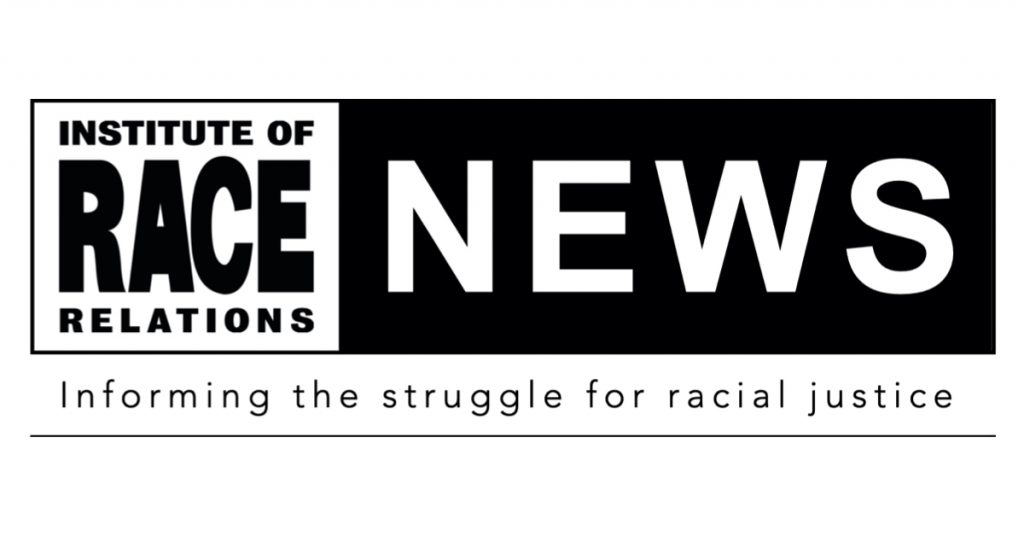10 – 24 October 2023
Racism, in essence, involves dehumanisation, the attaching of less value to certain lives. And it can also involve criminalisation, for example by turning one group into a suspect community needing control and harsher punishment. What we have witnessed here since 7 October is a transformation of a knee-jerk anti-Palestinianism into a fully-fledged anti-Palestinian racism permeating politics and British culture on a scale never witnessed before. For now the frameworks of the war on terror are superimposed on anti-Palestinianism, leading to the criminalisation of national symbols and cultural expressions in the diaspora such as the Palestinian flag or the Keffiyeh – moving the British Palestinian Committee to demand that public bodies ‘uphold their legal responsibilities to protect equal participation in democratic and civic space, by defending the rights of Palestinians in Britain and those who stand with our people in a spirit of solidarity and common humanity’.
Over the last two weeks, alongside our regular Calendar of Racism and Resistance, IRR staff have trawled through both the mainstream press and NGO, human rights and civil liberty advocacy alerts, in the UK and Europe, to collate the cases that expose ever more fault lines in the fight against racism. The facts that we have documented in our special Calendar on ‘Anti-Palestinianism, Suspect Communities and the Racist Backlash’ demonstrate the normalisation of anti-Palestinian racism. It starts in law and governance, spreads to cultural institutions and the media. The latter, far from following journalistic codes of impartiality are now complicit in the dehumanisation of those of Palestinian descent who, like Liberal Democrat British-Palestinian MP Layla Moran or the Palestinian ambassador to the UK Husam Zomlot, are expected collectively to account for the actions of Hamas.
But media coverage, deplorable as it is, has been little more than a reflection of the anti-Palestinian instincts of the government, already embodied within counter-terrorism policing. A counter-terrorism policing document, it was reported in 2020, listed the Palestine Solidarity Campaign as an extremist organisation. (This classification is all the more obtuse given the green light to Palestinian solidarity implicit in the scores of UN resolutions condemning Israel for illegal occupation of Palestinian land and the illegal building of civilian settlements on land taken by force.)
But what is different today is that the criminalisation of solidarity with Palestine and the dehumanisation of Palestinians are now being reinforced by a Labour shadow cabinet that seems to have lost its moral compass when it comes to defending international law in the Occupied Territories. Cultural centres not just in the UK but across Europe, which are cancelling Palestinian artists, are also complicit, as are universities, now suspending students and silencing dissenting Jewish academics who call for an end to ‘ethnic cleansing’ and ‘genocide’ in Gaza. Sport has not been exempt from the political current, with pro-Palestinian footballers and swimmer Abdelrahman Sameh, particularly vulnerable to disciplinary action or other punishment, and in the case of Sameh, death threats.
Thus, a third element is highlighted in our special Calendar on war and suspect communities, and that is the racist backlash in the Islamophobic and antisemitic incidents that have taken place in Europe. There has been a huge increase in referrals of both antisemitic and anti-Islamic ‘hate crimes’ in London since the start of October (218 this year as opposed to 15 last year and 103 as opposed to 42, respectively). Jewish and Muslim communities feel threatened and in need of extra protection for their institutions. And here again we see the same pattern, where collective blame is placed on Jews for the actions of the Israeli government, or Muslims for the actions of Hamas. We cannot stand by when synagogues or Jewish schools are targets for arson attacks or vandalism, or when staff at a Palestinian takeaway report being too frightened to turn up to work because of daily death threats.
And in all this it is impossible to ignore the global situation – for global racism, that situates the West as ‘collectively superior’ to the fanatical and irrational Orient, is now so imbricated in domestic racism as to make it impossible to unpick underlay from overlay. Tragically, as history teaches us, in times of war, it is innocent civilians who suffer the most, whether it be the secular peaceniks of Be’eri Kibbutz, the 224 hostages seized by Hamas and held captive, the perennially displaced of Jabalia camp or those sheltering in the al-Ahli Arab hospital compound. But this does not mean that we cannot think beyond the current situation, or take the long view. This is not just an asymmetrical war militarily but also an asymmetrical media-complicit propaganda war which systematically obfuscates the roots of the conflict in dispossession, occupation, human rights violations and the breaking of international agreements and laws. We refer IRR News readers to our journal Race & Class that has, since 1976, under the guidance of Eqbal Ahmad, Edward Said and Ibrahim Abu-Lughod tried to rebalance the narrative – revealing for example the way Britain’s Balfour Declaration paved the way for Palestinian dispossession and how Hamas, now denounced by Israel for its ISIS-style barbarism, was originally encouraged by the Israeli government so as to undermine the power of the PLO.
The lesson for anti-racists is that when you dehumanise a whole people, it has a profound effect on the culture and politics of society as a whole. And this is what makes it our duty to push back, before it sets a new standard and norm.

